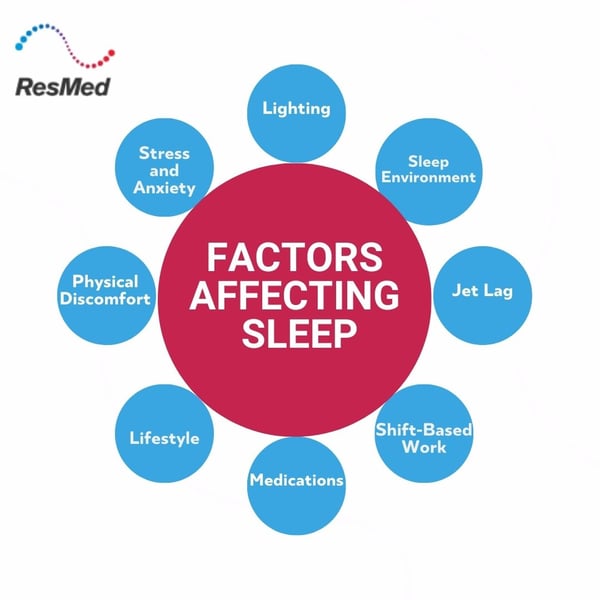Understanding the intricacies of factors that affect sleep is crucial to identify potential disruptors and pave the way for improved sleep hygiene. Let's delve deeper into the external and internal factors affecting sleep, along with lifestyle and cultural influences, and how they intertwine with our sleep patterns.
External Factors Affecting Sleep
1. Lighting: Our bodies rely on environmental cues like light to regulate the sleep-wake cycle. Bright lights, especially in the evening, can suppress melatonin production, delaying the body's readiness for sleep by tricking the internal clock.
2. Sleep Environment: Comfort and a feeling of safety in the sleep environment are paramount for quality sleep. Changes in surroundings, like sleeping in a new place or an unfamiliar environment, can cause disturbances in falling asleep easily.
3. Jet Lag and Shift-Based Work: Travelling across different time zones disrupts the body's circadian rhythm, causing jetlag. Similarly, shift-based work schedules with varying sleep timings can confuse the body clock, impacting the quality and consistency of sleep.
4. Medications: Certain medications and substances, such as caffeine, nicotine, and some prescription drugs like antidepressants, can interfere with sleep by altering neurotransmitter activity or stimulating the nervous system, affecting sleep duration and quality.

Internal Factors Affecting Sleep
1. Physical Discomfort: Body aches, muscle or joint pains, headaches, and other physical discomforts can hinder the ability to fall asleep or maintain a restful sleep throughout the night, leading to sleep disturbances.
2. Stress and Anxiety: Psychological factors like stress, anxiety, or depression can trigger hyperarousal responses, keeping individuals awake or causing frequent awakenings during the night. These conditions may lead to an imbalance in sleep stages, resulting in increased REM sleep and reduced deep sleep.
3. Lifestyle and Cultural Influences
Cultural norms and lifestyle choices significantly influence sleep patterns. Variances in work schedules, dietary habits, exercise routines, and societal pressures differ across cultures, impacting sleep timings and sleep quality. For instance, studies reveal variations in sleep duration and sleep timing among different regions globally, like the differences observed between Japanese, Spanish, and European sleep patterns.
Conclusion
Understanding these factors affecting sleep will empowers individuals to adopt strategies that promote better sleep. Incorporating sleep hygiene practices, such as maintaining a consistent sleep schedule, creating a conducive sleep environment, managing stress, and adopting healthy lifestyle habits, can help mitigate the impact of these factors on sleep quality.
While some external and internal factors may be beyond our immediate control, cultivating healthy sleep habits plays a pivotal role in optimising sleep quality and overall well-being.
Keep exploring: Click on Healthy Sleep, Thing to do after suspecting sleep problems , and Factors affecting Sleep to read more articles
